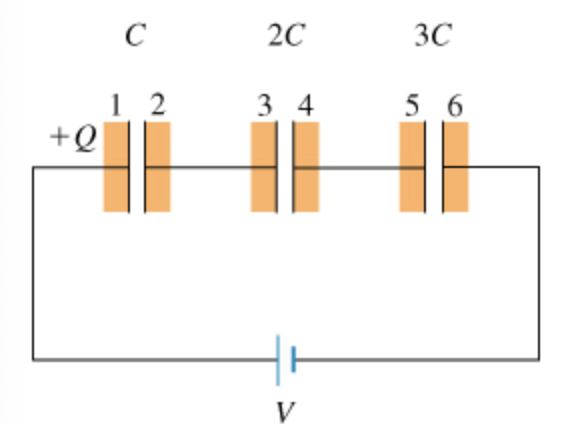Question
In: Physics
what are the charges on plates 3 and 6?

A.) What are the charges on plates 3 and 6?
B.) If the voltage across the first capacitor (the one with capacitance C ) is \({V^{\prime}}\), then what are the voltages across the second and third capacitors?
C.) Find the voltage \(V_{1}\) across the first capacitor.
D.) Find the charge Q on the first capacitor.
E.) Using the value of Q just calculated, find the equivalent capacitance \(C_{\mathrm{eq}}\) for this combination of capacitors in series.
Solutions
Expert Solution
1) the charges on plates 3 and 6 are +Q and -Q
The correct answer is C.+Q and -Q
2) When capacitors are connected in series, the charge on each is the same and equal to the total charge stored
In series combination, the potential across any capacitor is inversely proportional to its capacity
If the voltage across the first capacitor (the one with capacitance C) is V', then
V'=Q /C
The voltage across the second capacitor =Q/2C =(1/2)Q/C=V'/2
The voltage across the third capacitor =Q/3C =(1/3)Q/C=V'/3
The correct answer is B.V'/2 and V'/3
V= V_1 +V_2+V_3
V= V_1 +V_1/2+V_1/3
V = 11V_1/6
3 .The voltage V_1 across the first capacitor= V_1= 6V/ 11
4 The charge Q on the first capacitor = cV_1
V= V_1 +V_2+V_3
Q/C_eq =Q/c +Q/2c +Q/3c
1/C_eq =1/c +1/2c +1/3c
5 The equivalent capacitance C_eq for this combination of capacitors in series.
C_eq =6c /11
Related Solutions
Two parallel conducting plates have equal and opposite charges. Consider the area of conducting place is...
1) Two small, identical objects have charges of 6 μC and -3 μC. If the objects are...
Two parallel, metal plates with separation distance d = 1.00 cm carry charges of equal magnitude...
List 3 reasons why adapter plates are installed?
A mutual fund charges 6% front-end load and 3% operating and 12b-1 expenses. At the beginning...
A mutual fund charges 6% front-end load and 3% operating and 12b-1 expenses. At the beginning...
Charges 3 micro coulombs and -6 micro coulombs are placed 5cm from each other. Find where...
What would it mean if there was growth in the two -plasmid plates but not in...
What are the three processes that causes tectonic plates to move?
A student was given 6 plates taken from the incubator from a serial dilution done two...
- A bicycle wheel has a diameter of 63.9 cm and a mass of 1.86 kg. Assume...
- Cane Company manufactures two products called Alpha and Beta that sell for $150 and $110, respectively....
- What’s the cost of each component of capital and which need to be adjusted? What do...
- Answer the following questions 1) How does ASC 606 — Revenue From Contracts With Customers(new standard...
- Project 7-6: Sales Tax Calculator Create a program that uses a separate module to calculate sales...
- On June 30, Sharper Corporation’s stockholders' equity section of its balance sheet appears as follows before...
- In this journal you are asked to take the role of a mayor or congressional representative...
 Dr. OWL answered 5 years ago
Dr. OWL answered 5 years ago